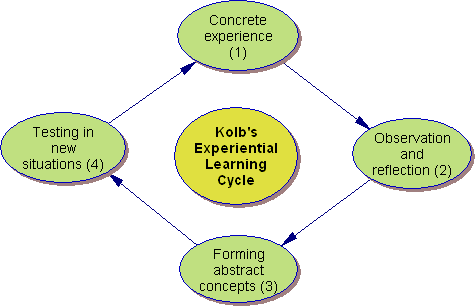Experiential Learning (Kolb)
Source of the original article : http://www.learning-theories.com/experiential-learning-kolb.html
Building upon earlier work by John Dewey and Kurt Levin, American educational theorist David A. Kolb believes “learning is the process whereby knowledge is created through the transformation of experience” (1984, p. 38). The theory presents a cyclical model of learning, consisting of four stages shown below. One may begin at any stage, but must follow each other in the sequence:
- concrete experience (or “DO”)
- reflective observation (or “OBSERVE”)
- abstract conceptualization (or “THINK”)
- active experimentation (or “PLAN”)
Kolb’s four-stage learning cycle shows how experience is translated through reflection into concepts, which in turn are used as guides for active experimentation and the choice of new experiences. The first stage, concrete experience (CE), is where the learner actively experiences an activity such as a lab session or field work. The second stage, reflective observation (RO), is when the learner consciously reflects back on that experience. The third stage, abstract conceptualization (AC), is where the learner attempts to conceptualize a theory or model of what is observed. The fourth stage, active experimentation (AE), is where the learner is trying to plan how to test a model or theory or plan for a forthcoming experience.
Kolb identified four learning styles which correspond to these stages. The styles highlight conditions under which learners learn better. These styles are:
- assimilators, who learn better when presented with sound logical theories to consider
- convergers, who learn better when provided with practical applications of concepts and theories
- accommodators, who learn better when provided with “hands-on” experiences
- divergers, who learn better when allowed to observe and collect a wide range of information
Reference:Kolb, David A. 1984. Experiential Learning: Experience as the Source of Learning and Development. Prentice-Hall, Inc., Englewood Cliffs, N.J.
